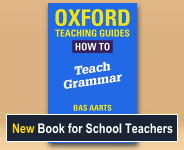Glossary: comparative
Explanation
The form of adjectives (and some adverbs) that ends in -er (e.g. quieter, faster). Sometimes a periphrastic form is used, e.g. more competent (rather than *competenter). See also superlative.Englicious contains many resources for English language in schools, but the vast majority of them require you to register and log in first. For more information, see What is Englicious?

